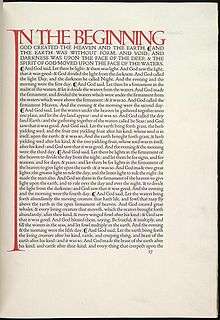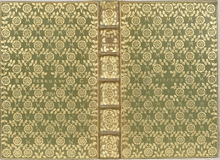T. J. Cobden-Sanderson
| T.J. Cobden-Sanderson | |
|---|---|
_by_William_Rothenstein.png) Portrait of Cobden-Sanderson by William Rothenstein | |
| Born | 2 December 1840 |
| Died | 7 September 1922 (aged 81) |
| Occupation | artist, bookbinder |
| Known for | Doves Type |


Thomas James Cobden-Sanderson (2 December 1840 – 7 September 1922) was an English artist and bookbinder associated with the Arts and Crafts movement.
Life
Sanderson was born in Alnwick, Northumberland, as Thomas James Sanderson. He attended a number of schools including the Royal Grammar School Worcester before entering Owen's College (Manchester University) and then Trinity College, Cambridge to study law.[1] He left without taking a degree, and entered Lincoln's Inn as a barrister. In 1882 he married (Julia Sarah) Anne Cobden, a socialist, and daughter of Richard Cobden, and they both took the surname Cobden-Sanderson.[2]
As a friend of William Morris, Cobden-Sanderson was involved with the Arts and Crafts ideology, and during a dinner party with the Morrises he was persuaded by Morris's wife Jane Burden to take up book-binding. In about 1884 he opened a workshop, abandoning his law practice. In 1887 Cobden-Sanderson suggested a new group be named the "Arts and Crafts Exhibition Society," and in so doing gave the movement its name.[3] His wife was concerned that his interests were too abstract and she encouraged him to become a bookbinder.[2] In 1893 he set up the Doves Bindery in Hammersmith, London, naming it after a nearby pub, The Dove. It was his wife who took credit for keeping the business running.[2] By 1900 he had established the Doves Press. Emery Walker became a partner in 1900 and oversaw the creation of the Doves Type used for all of their books. They produced a number of letterpress books, including the famous five-volume Doves Bible.
By 1909 Cobden-Sanderson and his partner Emery Walker were at the height of a protracted and bitter dispute involving the rights to the Doves Type in the dissolution of their partnership. As part of the partnership dissolution agreement, all rights to the Doves Type were to pass to Emery Walker upon the death of Cobden-Sanderson. Yet, when the press closed in 1916 Cobden-Sanderson threw the type along with its punches and matrices into the Thames. In this time, as there was no digitization, destroying the punches and matrices constituted destroying the font itself.
Until recently the Doves Typeface was thought to have been lost forever.[4] However, a digital version of the typeface was painstakingly recreated by Robert Green from 2010 to 2013.[5] In 2015, after searching the riverbed of the Thames near Hammersmith Bridge with help from the Port of London Authority, Green managed to recover 150 pieces of the original type.[6][7]
References
- ↑ "Sanderson (post Cobden-Sanderson), Thomas James (SNDR860TJ)". A Cambridge Alumni Database. University of Cambridge.
- 1 2 3 Howe,, A. C. (2004), "Sanderson, (Julia Sarah) Anne Cobden- (1853–1926)", Oxford Dictionary of National Biography, Oxford University Press, doi:10.1093/ref:odnb/56224
- ↑ Preston, Emily (April 1902). "T.J. Cobden-Sanderson and the Doves Bindery". The Craftsman (Eastwood, N.Y.). 2 (1).
- ↑ Cable, Carole (1974). "The Printing Types of the Doves Press: Their History and Destruction". The Library Quarterly. 44 (3): 219–230. doi:10.1086/620275. JSTOR 4306410. (subscription required (help)).
- ↑ "The fight over the Doves". The Economist. 21 December 2013. Retrieved 7 February 2015.
- ↑ Steven, Rachael (3 February 2015). "Recovering the Doves Type". CreativeReview Blog. Retrieved 7 February 2015.
- ↑ Wilmshurst, Nick (7 February 2015). "Lost typeface printing blocks found in river Thames". BBC News. Retrieved 7 February 2015.
Further reading
- Tidcombe, Marianne (2002). The Doves Press. British Library. ISBN 978-1-58456-084-5.
External links
| Wikisource has original text related to this article: |
- T.J. Cobden-Sanderson Collection at the Harry Ransom Center at the University of Texas at Austin
- Works by T. J. Cobden-Sanderson at Project Gutenberg
- Works by or about T. J. Cobden-Sanderson at Internet Archive
- The Doves Type at typespec.co.uk